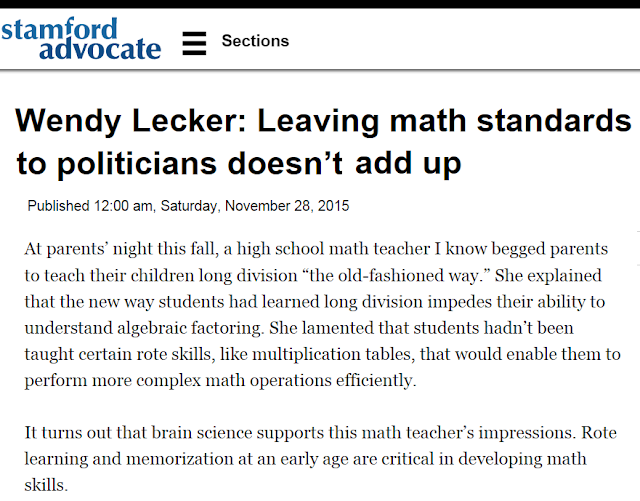Why Rote Learning Is Important in Mathematics
More than a year ago, this blog shared findings reported by a group of researchers at Stanford University School of Medicine. The study published in the journal Nature Neuroscience talked about evidence from brain imaging that showed the transition from procedure-based to memory-based problem-solving strategies. More recently, Wendy Lecker at the Stamford Advocate pointed out that current reforms in math education were not in line with what brain science had been informing us.
The last sentence of the excerpt above is clearly stated. Rote learning and memorization at an early age are critical in developing math skills.
In the previous post of this blog, "How Do Children Learn Math", the following part of a figure from the paper in Nature was highlighted:
As children mature (in fact in a period of just about one year), brain imaging shows a significant transition from counting to memory retrieval as a strategy to solve addition problems. This trend continues into adolescence and adulthood. It is the way the human brain develops.
Lecker also brings us back to a Wall Street Journal article by Engineering professor Barbara Oakley who wrote:
 |
| Above copied from the Stamford Advocate |
In the previous post of this blog, "How Do Children Learn Math", the following part of a figure from the paper in Nature was highlighted:
As children mature (in fact in a period of just about one year), brain imaging shows a significant transition from counting to memory retrieval as a strategy to solve addition problems. This trend continues into adolescence and adulthood. It is the way the human brain develops.
Lecker also brings us back to a Wall Street Journal article by Engineering professor Barbara Oakley who wrote:
"True mastery doesn't mean you use crutches like laying out 25 beans in 5-by-5 rows to demonstrate that 5 × 5 = 25. It means that when you see 5 × 5, in a flash, you know it's 25—it's a single neural chunk that's as easy to pull up as a ribbon. Having students stop to continually check and prove their understanding can actually impede their understanding, in the same way that continually focusing on every aspect of a golf swing can impede the development of the swing."Lecker then offers the following explanation on why we have become obsessed with this wrong way of educating children:
"Maybe the fad to force kids to explain every simple math procedure grew out of our selfie and Facebook culture; that tendency to document every mundane life experience. It certainly did not emanate from a true understanding or concern for how math skills develop."In my opinion, it is fine to make available opportunities for children to explain their math. What is definitely wrong is not to provide or even worse, discourage rote learning.

Comments
Post a Comment